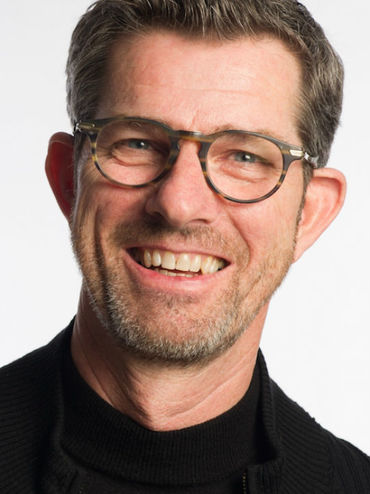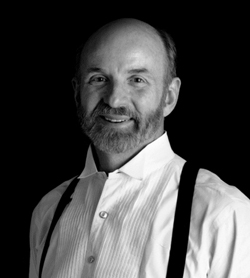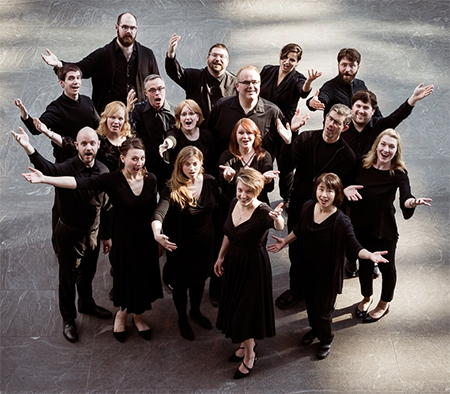by Jarrett Hoffman

Another phone call came with worse news. “Carlton was trying to set up his season this year for BlueWater,” MacPherson said during a recent interview, “because he knew he wasn’t going to live to see the day.”
Woods asked MacPherson if he would lead another collaboration between the two chamber ensembles. The BlueWater founder requested two selections for chorus and orchestra, and one for orchestra alone — and that’s what MacPherson will deliver on two dates this weekend.
On Saturday, May 19 at 7:30 pm at First Baptist Church in Shaker Heights, then on Sunday, May 20 at 3:00 pm at Baldwin Wallace University’s Gamble Auditorium, MacPherson will lead BlueWater and his own Cleveland Chamber Choir in “Vocal Verve.” The program will include J.S. Bach’s Ascension Oratorio, the First Suite from Ottorino Respighi’s Ancient Airs and Dances, and John Corigliano’s Fern Hill.
MacPherson called Woods’ passing “a sad, sad time,” and lamented that the two never got to meet in person. “I think I was his last new friend and acquaintance, but it was all through cyberspace.” One of the men’s common interests was single malt scotch. They had hoped to share a drink — though on one of their last phone calls, Carlton Woods (below) admitted that “he didn’t even like the taste of scotch anymore,” MacPherson recalled.

“We’re doing the one that’s probably the least known, the 1999 version,” MacPherson said, describing the work as beautiful, and this revision as a perfect fit for the two ensembles. “It’s going to be a fine balance — this time we have around 31 voices. And our mezzo soloist, Kira McGirr, is phenomenal. She’s sung with the group all of this season.”
Likewise in the Bach, the Choir will feature its own members as soloists: Kiko Weinroth, soprano, Kimberly Lauritsen, alto, Corey Shotwell, tenor, and Charles Austin Piper, bass-baritone. “They are all singing in the chorus and will step out for these magnificent solos,” MacPherson said. “We have the caliber of singer to do that on every part.”
The director said the size of his Cleveland Chamber Choir allows them to sing repertoire from as far back as the Renaissance and as recent as the present-day, plus everything in between. “When I started this group, there were already several top-quality ensembles, but none that did the whole gamut of the choral repertoire. I don’t feel like we compete with other groups, we just add something to the choral arts scene that was not there — and we’re having a lot of fun doing it.”
He praised his singers’ dedication to the group. “They love the repertoire we do,” he said. “And the chance to sing music at this level is what really keeps them coming back. They realize that singing choral music can be a blast.”

That project, funded by a College of the Arts Catalyst Grant, brought together five undergraduate composers to write one multi-movement work for chorus and orchestra, I Sing the Body, which also featured an element of concert dance.
“When you have five student composers, it’s kind of hard to have any musical or thematic unity in a piece,” MacPherson said. To achieve that unity, the composers set poetry that was all based on the human body. “These poems were all written by local students and adults, some of whom are refugees,” MacPherson said. “It was really a cool event.”
Speaking of music at Kent, MacPherson noted that his colleague, composer Frank Wiley, is retiring after 39 years in the School of Music. “Frank is just an amazing man,” MacPherson said. “I’m going to miss him very much. He’s what you wish for in any colleague. His music, mind, attention to detail and to high standards of musicality — he’s just the full package, and then on top of everything he’s such a great guy.”
In a recent ClevelandClassical.com interview with Wiley, he named the premiere of his Desert Rose, given by MacPherson and the KSU Chorale, among the notable performances of his career. “The choirs performed spectacularly,” MacPherson remembered. “I really like the piece — it’s devilishly hard. I intend to do it again, maybe with the Cleveland Chamber Choir down the road.”
Another hope for down the road: a long-term relationship with BlueWater. “It’s a privilege and an honor to sing with them,” MacPherson said. “We both get to do repertoire that we’ve never been able to do — I believe that outside of the Emergent Universe Oratorio, this is the first time they have accompanied a choir. So we’re both having fun, and this whole program is a gem for both of our organizations.”
As our interview was coming to a close, tip-off was nigh for Cavs vs. Celtics. Considering Cleveland Chamber Choir’s recent program “March Madrigal Madness,” I had to ask MacPherson about his interest in the round, orange ball.
He remembered following Michael Jordan “back in the day.” During the director’s 15 years living in San Antonio, he took an interest in the Spurs. Then he moved to Northeast Ohio, where the buzz of course surrounds LeBron James. “I kind of believe in supporting the sports teams where you live as much as you can,” MacPherson said.
And he was pleased with his choir’s March program, where listeners voted with applause to advance one madrigal over another. “It really was a lot of fun, and I think the audience listened differently because they were being asked to evaluate and vote.”
Published on ClevelandClassical.com May 15, 2018.
Click here for a printable copy of this article



